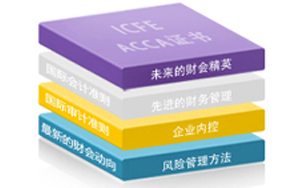ACCA科目简介
目前ACCA实现的是2007年开始执行的考纲,该大纲充分表达了雇主和专业人士的意见,反映了现代商务社会对财务人员的要求。在学习过程中使学员全面掌握财务、财务管理、审计、税务及经营战略等方面的专业知识,提升分析能力并拓展战略思维。新大纲共有十四门课程,分为两个部分,具体科目如下:
*一部分为基础阶段,主要分为知识课程和技能课程两个部分。知识课程主要涉及财务会计和管理会计方面的核心知识,也为接下去进行技能阶段的详细学习搭建了一个平台。知识课程的三个科目同时也是FIA方式注册学员所学习的FAB、FMA、FFA三个科目。
技能课程共有六门课程,广泛的涵盖了一名会计师所涉及的知识领域及必须掌握的技能。具体课程为:
课程类别 | 课程序号 | 课程名称(中) | 课程名称(英) |
知识课程 | F1 | 会计师与企业 | Accountant in Business (AB/FAB) |
F2 | 管理会计 | Management Accounting (MA/FMA) | |
F3 | 财务会计 | Financial Accounting (FA/FFA) | |
技能课程 | F4 | 公司法与商法 | Corporate and Business Law (CL) |
F5 | 业绩管理 | Performance Management (PM) | |
F6 | 税务 | Taxation (TX) | |
F7 | 财务报告 | Financial Reporting (FR) | |
F8 | 审计与认证业务 | Audit and Assurance (AA) | |
F9 | 财务管理 | Financial Management (FM) |
第二部分为专业阶段,主要分为核心课程和选修(四选二)课程。该阶段的课程相当于硕士阶段的课程难度,是对*一部分课程的引申和发展。该阶段课程引入了作为未来的资深会计师所必须的更资深的职业技能和知识技能。选修课程为从事资深管理咨询或顾问职业的学员,设计了解决更资深和更复杂的问题的技能。具体课程为:
课程类别 | 课程序号 | 课程名称(中) | 课程名称(英) |
核心课程 | P1 | 商业风险 | Governance, Risk and Ethics(GRE) |
P2 | 公司报告 | Corporate Reporting (CR) | |
P3 | 商业分析 | Business Analysis (BA) | |
选修课程 | P4 | 高ji财务管理 | Advanced Financial Management (AFM) |
P5 | 高ji业绩管理 | Advanced Performance Management (APM) | |
P6 | 高ji税务 | Advanced Taxation (ATX) | |
P7 | 高ji审计与认证业务 | Advanced Audit and Assurance (AAA) |
所有学生必须完成三门核心课程。
ACCA科目内容介绍
(F1/FAB) Foundations of Accounting in Business
To introduce knowledge and understanding of the business and its environment and the influence this has on how organisations are structured and on the role of the accounting and other key business functions in contributing to the efficient, effective and ethical management and development of an organisation and its people and systems.
(F2/FMA) Foundations of Management Accounting
To develop knowledge and understanding of providing basic management information in an organisation to support management in planning and decision- making.
(F3/FFA) Foundations of Financial Accounting
To develop knowledge and understanding of the underlying principles and concepts relating to financial accounting and technical proficiency in the use of double-entry accounting techniques including the preparation of basic financial statements.
(F4) Corporate and Business Law
To develop knowledge and skills in the understanding of the general legal framework, and of specific legal areas relating to business, recognizing the need to seek further specialist leg advice where necessary.
(F5) Performance Management
To develop knowledge and skills in the application of management accounting techniques to quantitative and qualitative information for planning, decision-making, performance evaluation, and control
(F6) Taxation (UK)
To develop knowledge and skills relating to the tax system as applicable to individuals, single companies, and groups of companies.
(F7) Financial Reporting (INT)
To develop knowledge and skills in understanding and applying accounting standards and the theoretical framework in the preparation of financial statements of entities, including groups and how to analyse and interpret those financial statements.
(F8) Audit and Assurance (INT)
To develop knowledge and understanding of the process of carrying out the assurance engagement and its application in the context of the professional regulatory framework.
(F9) Financial Management
To develop the knowledge and skills expected of a finance manager, in relation to investment, financing, and dividend policy decisions.
(P1) Governance, Risk and Ethics
To apply relevant knowledge, skills and exercise professional judgment in carrying out the role of the accountant relating to governance, internal control, compliance and the management of risk within an organisation, in the context of an overall ethical framework.
(P2) Corporate Reporting (INT)
To apply knowledge, skills and exercise professional judgement in the application and evaluation of financial reporting principles and practices in a range of business contexts and situations.
(P3) Business Analysis
To apply relevant knowledge, skills, and exercise professional judgement in assessing strategic position, determining strategic choice, and implementing strategic action through beneficial business process and structural change; coordinating knowledge systems and information technology and by effectively managing processes projects, and people within financial and other resource constraints.
(P4) Advanced Financial Management
To apply relevant knowledge, skills and exercise professional judgement as expected of a senior financial executive or advisor, in taking or recommending decisions relating to the financial management of an organisation.
(P5) Advanced Performance Management
To apply relevant knowledge, skills and exercise professional judgement in selecting and applying strategic management accounting techniques in different business contexts and to contribute to the evaluation of the performance of an organisation and its strategic development.
(P7)Advanced Audit and Assurance (INT)
To analyse, evaluate and conclude on the assurance engagement and other audit and assurance issues in the context of best practice and current developments.




